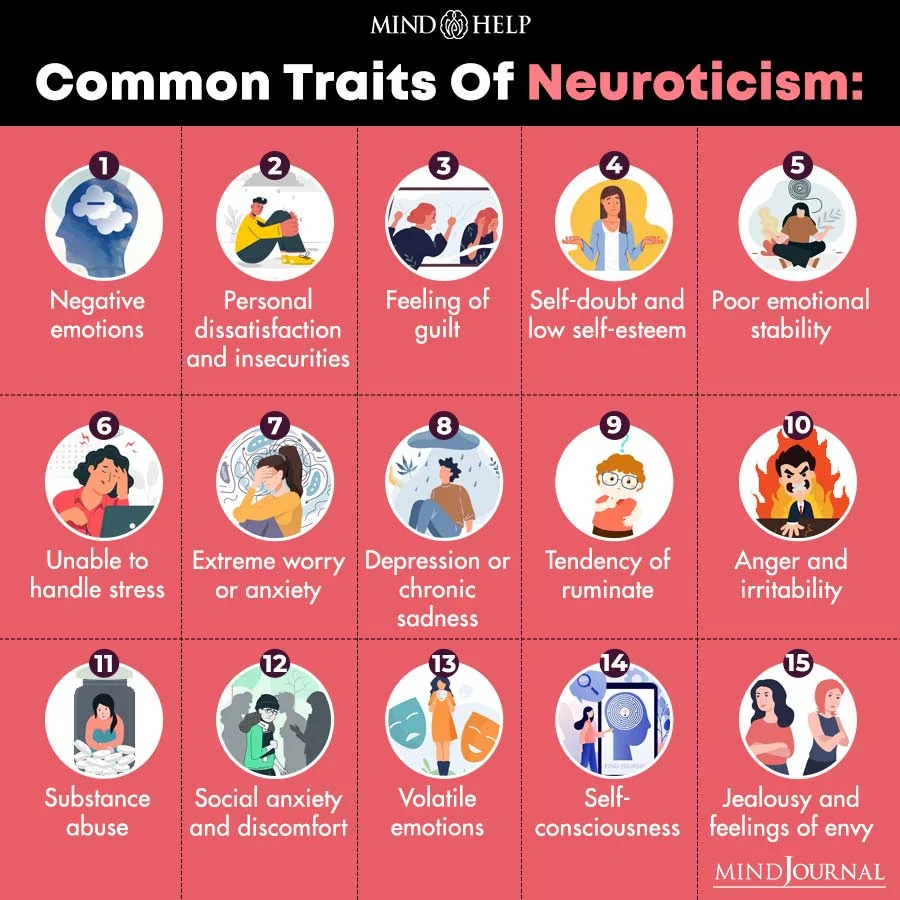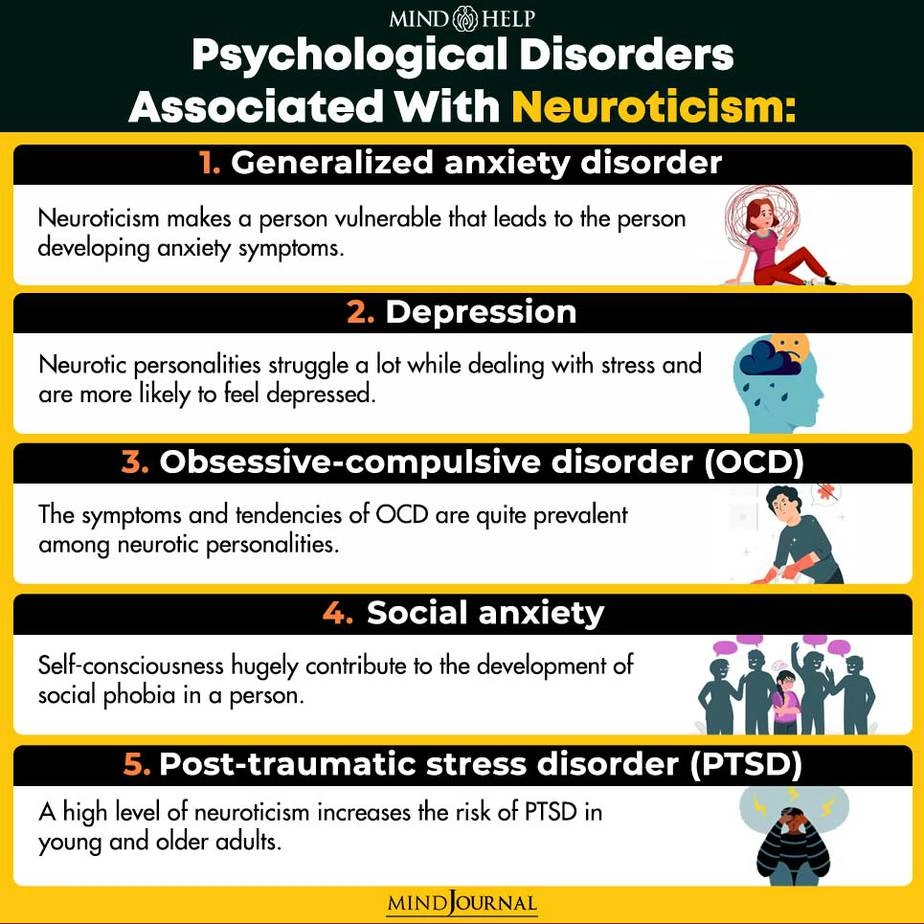In the intricate tapestry of human personality, neuroticism stands as a prominent thread, influencing the way individuals perceive and respond to the world around them. Let us explore the meaning of neuroticism, what are neurotic personality traits, what causes neuroticism and how to cope with neuroticism.
By delving into the complexities of neuroticism, we can cultivate a deeper understanding of ourselves and others, fostering personal growth and emotional well-being.
Defining the meaning of neuroticism
To put it simply, neuroticism is a personality trait that influences how we experience and navigate the world of emotions and anxieties. It is characterized by the tendency to experience negative emotions such as anxiety, worry, and self-doubt.
Neuroticism is a fundamental aspect of human personality, encompassing a range of emotional states and responses. It is one of the five major personality traits in the Five Factor Model (also known as the Big Five personality traits).

It is important to note that neuroticism exists on a continuum, with some individuals exhibiting higher levels of neuroticism than others.
Related: The Big Five Personality Traits and What They Mean
What is high neuroticism?
High neuroticism refers to a personality trait characterized by an individual’s tendency to experience heightened levels of negative emotions such as anxiety, worry, and sadness. Individuals high in neuroticism are more prone to experiencing negative emotions and are often described as “emotionally sensitive” or “emotionally reactive.”
Those with high neuroticism are often more sensitive to stressors and may struggle to regulate their emotions effectively, impacting their overall well-being and interactions with the world around them. These individuals may react strongly to stressors and perceive threats where others may not.
Individuals with high levels of neuroticism tend to experience negative emotions more frequently and intensely than those with low neuroticism. They may exhibit traits such as anxiety, worry, self-doubt, and emotional reactivity.
Understanding the meaning of neuroticism and what is high neuroticism helps you realize that this personality dimension encompasses a range of emotional and behavioral characteristics.
What causes neuroticism
The exact causes of neuroticism are complex. Neuroticism is shaped by a combination of genetic predispositions and environmental and psychological factors. Research suggests that some individuals may be genetically predisposed to higher levels of neuroticism.
However, environmental factors such as upbringing, childhood experiences, and societal influences also play a significant role. For instance, a person who grew up in a highly critical environment may develop heightened neurotic tendencies as a result of constant scrutiny and the fear of making mistakes.
Here are some of the factors that will explain what causes neuroticism:
1. Genetics
Research suggests that genetics play a significant role in shaping personality traits, including neuroticism. Twin studies and family studies have indicated a heritable component to neuroticism.
Certain genetic variations might make individuals more predisposed to experiencing negative emotions and heightened sensitivity to stressors.
2. Early childhood experiences
Childhood experiences, especially those involving trauma, neglect, or inconsistent caregiving, can impact the development of personality traits, including neuroticism.
Adverse childhood experiences can create a foundation for heightened emotional reactivity and vulnerability to anxiety.
3. Environmental factors
Stressful life events, such as significant life changes, trauma, or ongoing negative experiences, can contribute to the development of neuroticism. Chronic stressors can exacerbate feelings of anxiety and other negative emotions.
4. Parenting styles
Parenting styles that are overly controlling, critical, or lacking in emotional support can contribute to the development of neuroticism.
Children who grow up in environments where their emotional needs are not adequately met may develop a heightened sensitivity to stressors and a tendency to experience negative emotions.
Related: From Youth To Old Age: Does Personality Change With Age?
5. Biological factors
Neurotransmitter imbalances in the brain, hormonal changes, and brain structure can also influence an individual’s vulnerability to neuroticism.
For example, abnormalities in brain regions associated with emotional regulation and anxiety processing might contribute to the trait.
6. Cognitive factors
Cognitive processes, such as rumination (repetitive negative thinking) and a tendency to catastrophize situations, can contribute to neuroticism. Individuals with high levels of neuroticism may interpret situations in a more negative and anxiety-inducing manner.
7. Personality development
Neuroticism can emerge and develop as part of an individual’s personality over time due to a combination of genetic predisposition and life experiences.
Early experiences and genetics might create a foundation for certain personality traits, which then interact with ongoing experiences to further shape neurotic tendencies.
It’s important to note that neuroticism exists on a spectrum, and while some people might have a higher predisposition to neuroticism, others may exhibit minimal traits of it.
Additionally, neuroticism interacts with other personality traits and environmental factors to shape an individual’s overall psychological makeup. If someone is struggling with high levels of neuroticism that interfere with their well-being, seeking support from mental health professionals can be beneficial.
Now that we know the meaning of neuroticism and what causes it, let’s find out more about what are neurotic personality traits.
Read Understanding Zodiac Anxiety: Astrology Discloses Anxiety Triggers Of Each Sign
What are neurotic personality traits
Neuroticism manifests in various personality traits that define individuals high in neurotic tendencies. These traits include anxiety, moodiness, emotional instability, self-consciousness, and perfectionism.

Let’s explore what are neurotic personality traits in detail:
1. Anxiety
Individuals high in neuroticism often experience persistent and excessive worry and nervousness. They may anticipate negative outcomes and feel tense and on edge.
2. Moodiness
Neurotic individuals tend to experience frequent fluctuations in mood, ranging from sadness and irritability to happiness and elation. These mood swings can be intense and unpredictable.
3. Emotional instability
Emotional reactivity is a hallmark of neuroticism. People high in neurotic tendencies may have strong emotional reactions even to minor stressors, leading to heightened levels of distress.
4. Self-consciousness
Neurotic individuals are often acutely aware of how others perceive them. They may be overly concerned about their appearance, behavior, or social interactions, often fearing judgment or rejection.
5. Perfectionism
Striving for perfection is a common trait observed in individuals with high neuroticism. They may set excessively high standards for themselves and experience intense dissatisfaction when they fall short.
Related: Red Flags of Rage: 10 Characteristics Of An Aggressive Person
How to cope with neuroticism
Understanding the meaning of neuroticism and what is high neuroticism is not enough, we must also know how to cope with it. Managing and coping with neuroticism is crucial for maintaining emotional well-being and leading a fulfilling life.
Here are some effective strategies to navigate neurotic tendencies:
1. Self-awareness
Developing self-awareness is the first step in managing neuroticism. Recognize and acknowledge your own emotional patterns and triggers. Pay attention to the thoughts and beliefs that contribute to your negative emotions.
2. Mindfulness and meditation
Mindfulness practices can help you cultivate a non-judgmental awareness of your thoughts and emotions. Meditation and deep breathing exercises can promote relaxation and reduce anxiety.
3. Cognitive restructuring
Challenge and reframe negative thoughts and beliefs associated with neuroticism. Replace irrational and catastrophic thinking patterns with more rational and balanced perspectives.
4. Emotional regulation
When learning how to cope with neuroticism, know techniques to regulate and manage your emotions effectively. This may include engaging in activities that bring you joy, practicing self-care, and seeking social support when needed.
5. Seeking professional help
If neurotic tendencies significantly impact your daily life and well-being, consider seeking the support of a mental health professional. A therapist can provide guidance, support, and evidence-based interventions to help you manage neuroticism.

Embracing Neuroticism
While neuroticism is often associated with negative emotions, it’s essential to recognize that there can be positive aspects to this personality trait. Neurotic individuals often possess heightened empathy, creativity, and sensitivity to others’ emotions.
Their acute awareness of potential risks and drawbacks can drive them to be cautious and prepared.
Related: How Shallow Is Too Shallow? Understanding Shallow Personality Meaning, Signs And Causes
Takeaway
Neuroticism, with its intricate tapestry of traits and influences, holds great meaning in understanding human personality. By unraveling the meaning of neuroticism and exploring what are neurotic personality traits, what causes neuroticism, and how to cope with neuroticism, we can cultivate self-awareness, empathy, and emotional well-being.
Remember, neuroticism is a part of the rich diversity of human personalities, and by embracing it, we can foster personal growth and create a more compassionate and understanding world.
Frequently Asked Questions (FAQs):
What is a neuroticism personality?
Neuroticism refers to a trait marked by heightened emotional sensitivity, anxiety, and negative emotional reactions to stressors, influencing behavior and well-being.
What is an example of neuroticism?
Constantly worrying about small details, imagining worst-case scenarios, and experiencing frequent anxiety attacks in response to everyday stressors are examples of neuroticism.
What is the role of neuroticism?
Neuroticism influences emotional reactivity, stress response, and how individuals process and manage negative emotions, affecting their overall psychological well-being.









Leave a Reply
You must be logged in to post a comment.